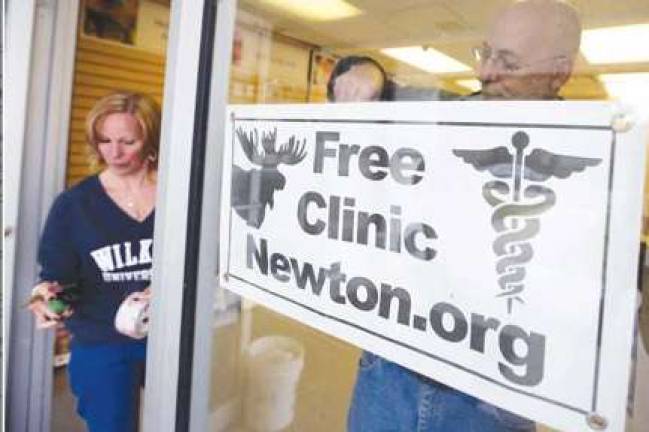Free clinic reopens

By Nathan Mayberg
NEWTON — Those who can’t afford health care, received a holiday gift when Dr. Jeffrey Liegner reopened his free clinic over the weekend.
The clinic had been shut down by the town of Newton for approximately five weeks after he failed to meet certain codes, setup his fire alarm and pay required municipal fees.
He estimates that the fees, added work and new contracts will cost him about $1,200 to get the clinic back open.
Liegner said he received “emotional and financial support from the community,” after he publicized his case with the town.
“I feel renewed,” he said. “I am enthusiastic.”
Liegner said he is very appreciative of the financial assistance, which he used to buy medications for his patients, including insulin, inhalers, hypertension medicine and antibiotics.
The clinic, with a group of volunteer doctors, technicians and nurses, serves approximately 1,200 people a year, he said.
Without it, a lot of his clinic’s clients would have ended up in an emergency room, which costs an average of $1,000, Liegner said.
Many of his clients can’t afford the medications that they are prescribed even if they have insurance, Liegner said.
“It’s very frustrating,” he said.
Liegner estimated that one-third of those who use his clinic aren’t able to sign up for Obamacare and receive health insurance.
He said some have trouble providing documentation or find the process too complicated.
“It’s deliberately complicated,” Liegner said.
“Bureaucracy has a tendency to do that,“ he said.
He spoke about clients who have to buy prepaid calling cards and who can’t afford to wait an hour on the phone to complete the signup process over the phone on their limited minutes.
Liegner, an ophthalmologist whose practice is based in Sparta, was born in Newton.
He opened the clinic two years ago after spending many years overseas volunteering to provide free eye care and cataract surgeries in far away regions.
Liegner’s clinic is recognized by the federal government, which acts as the insurance agent. That’s how his team of volunteer doctors are able to provide their care.
Initially, he objected to the requirements placed on his office, such as needing permits for a change of use and for doing electrical work and building partition walls.
“My fundamental thoughts are government exists to serve the public good and I could never understand how closing the public clinic served the public good,” Liegner said.
“We take care of our neighbors,” he said.